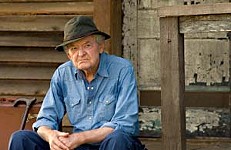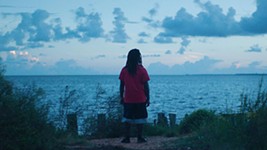Building a New Kingdom
AFS Doc nights: 'Sweet Dreams'
By Anne S. Lewis, Fri., July 11, 2014
Who would have thought that a mere two decades after a genocide, Rwanda could rebound with life lessons about reconciliation and healing? Amazing but true. Sibling filmmakers Lisa and Rob Fruchtman's Sweet Dreams presents a Rwandan tale that tempers an excruciatingly brutal past with a feel-good story about an all-women troupe of drummers who then go on to open a successful ice cream shop. The horrors and scars of the past, the elephant in the room, are not glossed over here but instead deftly layered into the fabric of the narrative. In the end, we emerge with both a strong sense of the past and the resilience of the survivors to fashion a positive future.
Following the 1994 genocide, during which Tutsi and Hutu neighbors, friends, and families turned on one another, the surviving population of Rwanda was close to 70% women. The film opens with a rousing, incredibly joyous, and cathartic performance by Ingoma Nshya (which means "new kingdom"), the country's first and only all-female drumming troupe. (Previously, drumming had been taboo for women.) The group of 60 was formed by Kiki Katese, a pioneering Rwandan theatre director, as a path to healing and a way for troupe members from both sides to rekindle the human spirit that the genocide had snuffed out.
But woman does not live by cathartic drumming alone. There was food to put on the table. While in the U.S. for a theatre lab, Katese hatched the idea to open the first ice cream shop in Rwanda, modeled after the Blue Marble Ice Cream shop she'd seen in Brooklyn. The Brooklyn owners came to Rwanda to help get the business off the ground, an endeavor not without its singular challenges, as one might expect. The Fruchtmans saw the film possibilities there, as Rob Fruchtman explained, "not only [because of] the uniqueness of the venture but as a way to examine Rwanda in a positive light years after the genocide."
Austin Chronicle: What was the toughest part of producing this film for two Americans?
Rob Fruchtman: Our biggest challenge was making a film in another language. This meant having translators with us at all times and spending most evenings with our team of translators going through the day's footage. And then retranslating everything once we were back home to make sure it was all accurate. This proved to be a hugely time-consuming effort.
AC: How do Tutsis and Hutus coexist peaceably today?
RF: We were amazed at the total absence – in public – of tribal acknowledgement. There are no official Tutsis or Hutus; everyone is Rwandan. In private, of course, these differences will take generations to overcome. Recovery from a genocide as brutal as Rwanda's does not happen because the government mandates it; it will take work and time. We were so impressed, however, with Rwandans' willingness to confront the issues, deal with them, and work toward reconciliation and forgiveness. It takes tremendous strength to be able to attempt this, and Rwandans are doing it.
AC: Did you come away with any new insights into the genocide?
RF: The Rwandan genocide defied logic in many ways – how two people who look similar, speak a common language, and live side by side can descend into this level of cruelty boggles the mind. But we came to understand the truly corrosive effect of the period of Belgian colonialism that exacerbated the division between Hutu and Tutsi, and saw that the world's indifference, and both the U.S. government and the U.N.'s active determination to not do anything, actually allowed a genocide that might have been prevented from happening.
AC: What would you like viewers to take away from your film?
RF: We'd like viewers to see Rwanda in a different light – not as a poor African country where people barbarically slaughtered each other (the usual narrative) but as a beautiful land actively rebuilding itself into a viable, vibrant, and economically successful country.
AC: Any new post-film developments?
RF: The ice cream shop just celebrated its fourth anniversary. It's a success. And the drummers continue to flourish, traveling to the U.S. and Europe with the film and on their own. We wish them great success and look forward to celebrating with them this fall when we bring Sweet Dreams to Rwanda for the first time.
The Austin Film Society screens Sweet Dreams on Wednesday, July 16, 7:30pm, at the Marchesa Hall & Theatre. See www.austinfilm.org for ticket info.











